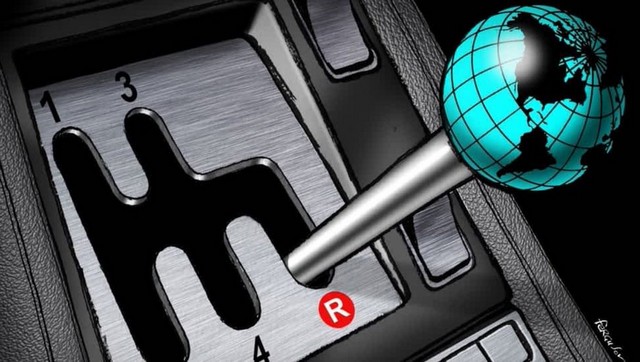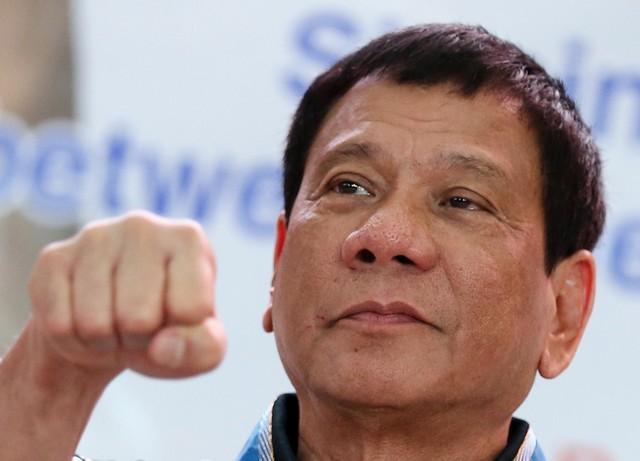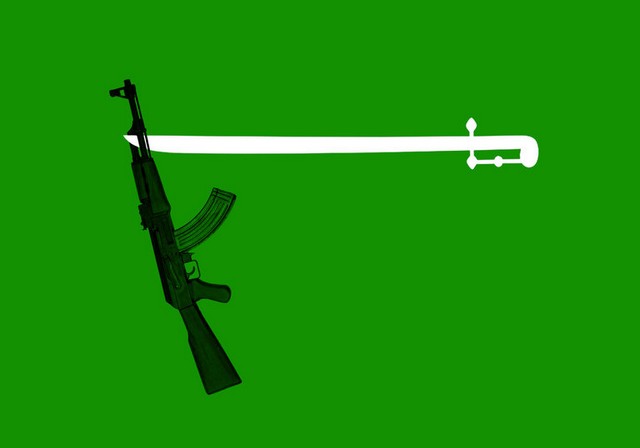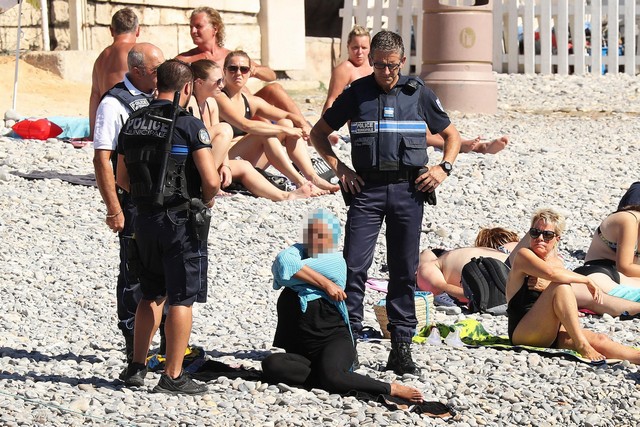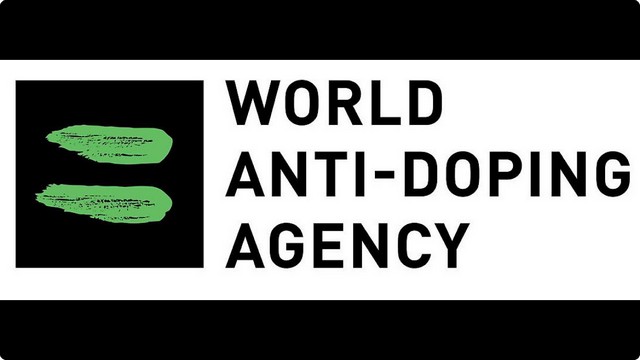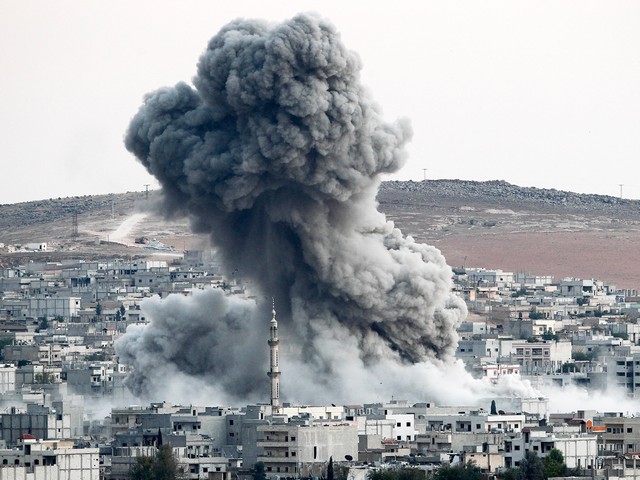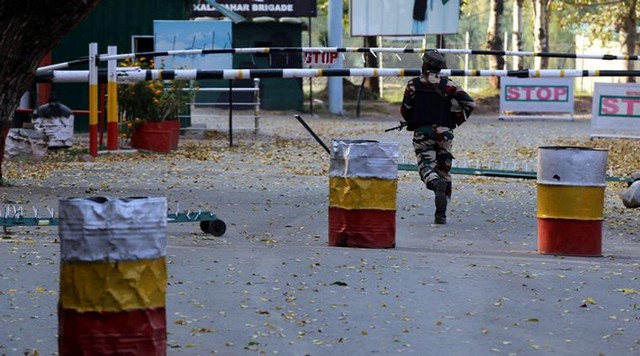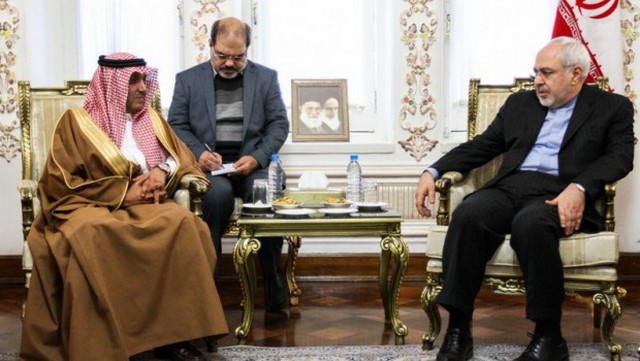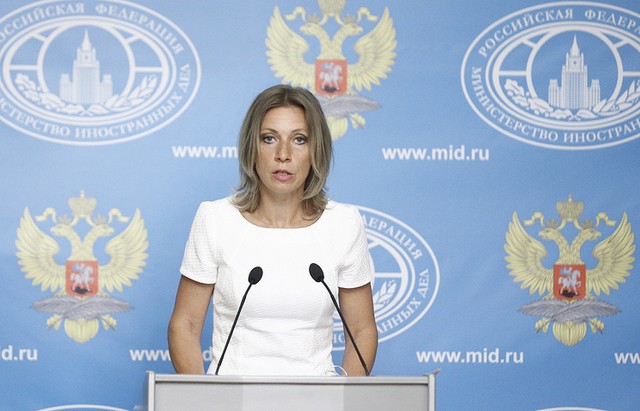By Andre Vltchek
In Europe, oppression is never really called by its true ugly name. It is constantly concealed by lofty slogans such as culture, even tolerance. Repression, discrimination and harassment are administered in order for the ‘entire society to be free’.
Or so at least the official narrative goes.
In France, recent and ugly row overso-called burkinis, a swimsuit used by many Muslim women all over the world, has demonstrated how little tolerance there really is in today’s Europe for other cultures and for different ways of life.
Recently, France’s highest administrative court has ruled that “burkini bans” being enforced on the country’s beaches are illegal and a violation of fundamental liberties. Still, more than 90 percent of French people are supporting the ban, which is thoroughly illogical and philosophically as well as ethically indefensible.
What is suddenly so shocking about a woman wearing a wetsuit on some French beach? And let’s face it:burkinisare nothing else but a wetsuit, which is commonly used on countless beaches of California, Australia, and Europe, in fact all over the world, by surfers and other water sport enthusiasts.
Just compare these images and these. Can you really tell much of a difference?
According to Wikipedia, a wetsuit is:
“…A garment, usually made of foamed neoprene, which is worn by surfers, divers, windsurfers, canoeists, and others engaged in water sports, providing thermal insulation, abrasion resistance and buoyancy.”
If courts manage to resurrect the ban (and actually some municipalities have already declared that they will uphold it no matter what), are the French police going to interrogate women on public beaches, while trying to determine whether they are wearing these plastic garments simply because they are planning to go surfing, or because of their religious beliefs? Would the first reason be allowed, while the other one forbidden?
Are we heading towards an era when people will be forced to confess to the authorities, why they are choosing to cover their bellies and shoulders? And is this going to re-define the meaning of ‘freedom’?
Who would be free to cover and who would not? Would the French state be permitted to decide what is the legitimate menace from which a woman should be allowed to protect herself from?
For instance, would the cold be ok? Imagine Paris, in January or February;100 degrees Celsius below zero… Most of the women you pass on the streets (Christian, Muslim and atheist) are “fully covered”, aren’t they? What can you see of them? Nothing, almost nothing! Their entire bodies are covered; their heads are covered, even their feet and hands are covered (unlike the hands and feet of women wearing burkinis). You travel to Grenoble in the winter, and the chances are that women will even be covering their faces with scarves. You know why, right? Because they are cold! Is this reasonOK, or should the French authorities demand that they expose their bellybuttons or shoulders or legs, in order to prove how “European”, how “French” they are?
Fine, so covering yourself up from the cold is most likely admissible; it is not ‘un-European’.
But what about the heat; is it OK to protect yourself from sun? In almost the entire Southeast Asia, but also in some parts of Latin America and the Sub-Continent, women want to be as white as possible. Unlike Western women, they hate suntan. I used to live in Vietnam and in Indonesia, as well as in many parts of Latin America, so I know… In the summer in Hanoi, you spot those (mainly secular, I emphasize it here!) elegant ladies on designer scooters, covered from head to toe: their feet are covered; they wear gloves, long dresses (áodài) or pants, most likely a helmet and underneath one more layer of headwear, plus sun glasses. Sometimes their mouth and nose is ‘protected’ by some fabric as well. While French women are fighting against the cold during the cold winters, hundreds of millions of women all over the world are covering themselves up because they are fighting against the sun. Could that be tolerated in France? Or is it unacceptable; just more evidenceof how badly foreigners are ‘integrating’?
But back to the beach… Would wetsuits or burkinis or whatever they are called by,be out-rightly banned, or only when a woman decides to go into the water? And as we know, when we go diving, we all, men and women, have to ‘cover ourselves up’ fully. So even if a woman would not be allowed to enter the water unless she exposes herself, could she still be covered if she would intend to go diving, surfing, or kayaking? Would there be some‘benevolent set of exceptions’?
And one more question: ‘If all women were to be required to expose themselves (by the new French law), then how much has to be actually shown?’ Could 60% of their skin be covered, or would only 40% be tolerated? Is there going to be some new and precise measuring device supplied to the police, calculating whether the law hasactually been broken?
And what about the punishment? Should women be fined? Should they be arrested, or even deported? Should they be forced to show their legs? Should police simply kick them out of the beaches? I really want to know.
Does it all sound absurd? But of course! But sadly, it is also real. To ban or not to ban burkini is one of the most passionately debated topics in Europe today!
That Europe is a ‘beacon of freedom’ is something that only Europeans (and far from all of them) truly believe. While anti-immigrant bigots are protesting against those relatively few migrants arriving at the EU doors every year, Europe annually literally regurgitates millions of its citizens, those who cannot stand living in what they see as a sad, oppressive and deteriorating continent. Legal and illegal European migrants are heading for North and South America, for Southeast Asia, China, even Sub-Continent and parts of Africa. Annually, they are entering millions of arranged marriages in order to secure local residency permits; others are crisscrossing Asia during their ‘visa runs’.
Many of the European migrants living abroad are very far from being ‘culturally sensitive’.Those who have plenty of money are buying off entire coastal areas of Asia and Africa. Entire nations like Thailand, Cambodia or Kenya are getting culturally ruined.
It is hardly ever debated in Europe:what is actually more damaging to local cultures – thoseMuslim women covering their bodies and hair on the streets and the beaches of Europe, or those literally millions of European potbellied, drunk,and half naked men in their sixties and seventies, promenading themselves publicly with their local teen female or male ‘acquisitions’ all over the Asian and African cities, villages and beaches?
And what about the European women, with their exposed breasts, wearing hardly detectable bikinis on the beaches of the once conservative Muslim communities of Indonesian Lombok or Southern Thailand?
I hate to write about this topic fleetingly, in such a short essay. I have lived, for many years, in Asia, Africa, Latin America and the Middle East. The destruction of local cultures and entire communities by European migrants amounts toan extremely disturbing and painful topic, worthy of in-depth analyses. I mainly address these issues in my novels.
But this absurd anti-burkini outburst in France suddenly forced me to react, as it is thoroughly one-sided and hypocritical.
My ability to cope with today’s Europe is quickly evaporating. I still go there, perhaps 4 times a year, to meet my translators and publishers, to show my films, to give a speech here and there, or to see my mother who married a German around a quarter of century ago. I plan to stay for a week, but mostly I escape after 2-3 days.
The continent rubs me up the wrong way. I feel terribly un-free there. I’mforced to eat lunches and dinners at particular designated hours (as if Europe does not have tens of millions of doctors, pilots, writers, sex workers, firefighters, train operators and others who are on totally different schedules). In September I cannot buy a windbreaker that I forgot to pack, as only clothes for cold weather are now available in all department stores. I stopped renting cars in Europe, as even passing the speed limits by 5km/h kept getting me endless (electronically processed) fines. Unlike in China or in Cuba, I am not allowed to film or photograph at European train stations or at some ‘sensitive areas’. I was even stopped and chased away when I filmed the ice skating ring in front of the Municipality building in Paris! Surveillance cameras keep watching me from almost every corner, and the mainstream media feels ridiculously censored and submissive to the regime.A few months ago, when I travelled from Lebanon to Germany on Air France via Paris, both my suitcases were cut open by a saw, and then delivered to the final destination in plastic bags. “For security reasons they were ‘checked’ at Charles de Gaulle Airport in Paris, as your bags were travelling from the Middle East,” I was told.
Of course I have a choice to stay for a while or to leave. And mostly, I leave. I frankly dislike 21st Century Europe, so why should I stay for longer than is necessary.
But many foreigners do not have this luxury. Their countries were raped, plundered and destabilized by the West, by NATO, by the US and by Europe. They are trying to survive, somehow. Surprisingly, only very few come to Europe! Very, very few compared to the millions of Europeans who are annually shutting the door behind their backs and leaving – leaving permanently, for distant shores.
Other ‘foreigners’ were born in Europe, but were never accepted. Were they to be born in Brazil or modern day South Africa, no one would even blink. They are Muslims, so what? They want to cover themselves on the public beaches? Well, it is hot and unusual, but illegal! How could it be illegal?
Europe is not at peace with itself. It robbed all over the world, it became rich because of colonialist and neo-colonialist plunder, but there is no joy behind its walls. Whenever I speak to Greeks, French, Germans, Italians, Czechs or Danes, I clearly feel it. Most Europeans do realize that their continent is in decline.
When one does not like his or her home, why not to re-think its concept, and rebuild it? Why not bring in totally new, even foreign ideas? Why stick to what makes it so oppressive?
But again, European ‘logic’ is quite different! The more dissatisfied people become, the more conservative and inward looking they get. Foreigners irritate them, or they even horrify and infuriate them. Unless they totally ‘adopt’ (abandon their culture), the majority of Europeans want them out.
In reality, Muslim women wearing burkinis is not about burkinis at all. At the beginning of this essay, we already illustrated how absurd the anti-burkini laws and regulations really are.
It is about something else. It is about the globally disliked culture of colonialist oppression and exceptionalism, flexing its muscles once again, at home and abroad. It is actually much more terrible than it looks. The movement to ban burkinis has its roots in a horrible past, when entire nations and cultures were annihilated by European barbaric expansionism.
So read between the lines:
“You can wear any wet suit, but not a burkini. It is exactly the same thing, but the wetsuit is our own invention (and therefore it is right), while the ‘burkini’ was designed by and for ‘the others’ (therefore it is clearly wrong). Remember, only our definitions are allowed on this Planet.
We are not religious or cultural fundamentalists (because only ‘the others’ can be), but we will protect our right and freedom to tell the world what can be believed, thought or even worn. Amen!”
This is the iron, unapologetic logic of the imperialism.
Therefore, poor burkinis should be defended! Let’s all buy them, even us, men. After all, when you look at those old black and white photos depicting European swimming pools and beaches, many dudes were wearing almost identical all-covering stuff, and so were the women. Just see it here!
Andre Vltchek is a philosopher, novelist, filmmaker and investigative journalist. He covered wars and conflicts in dozens of countries. His latest books are: “Exposing Lies Of The Empire” and “Fighting Against Western Imperialism”. Discussion with Noam Chomsky:On Western Terrorism. Point of No Return is his critically acclaimed political novel. Oceania – a book on Western imperialism in the South Pacific. His provocative book about Indonesia: “Indonesia – The Archipelago of Fear”. Andre is making films for teleSUR and Press TV. After living for many years in Latin America and Oceania, Vltchek presently resides and works in East Asia and the Middle East. He can be reached through his website or his Twitter.
(First published by NEO (New Eastern Outlook)
19 September 2016

